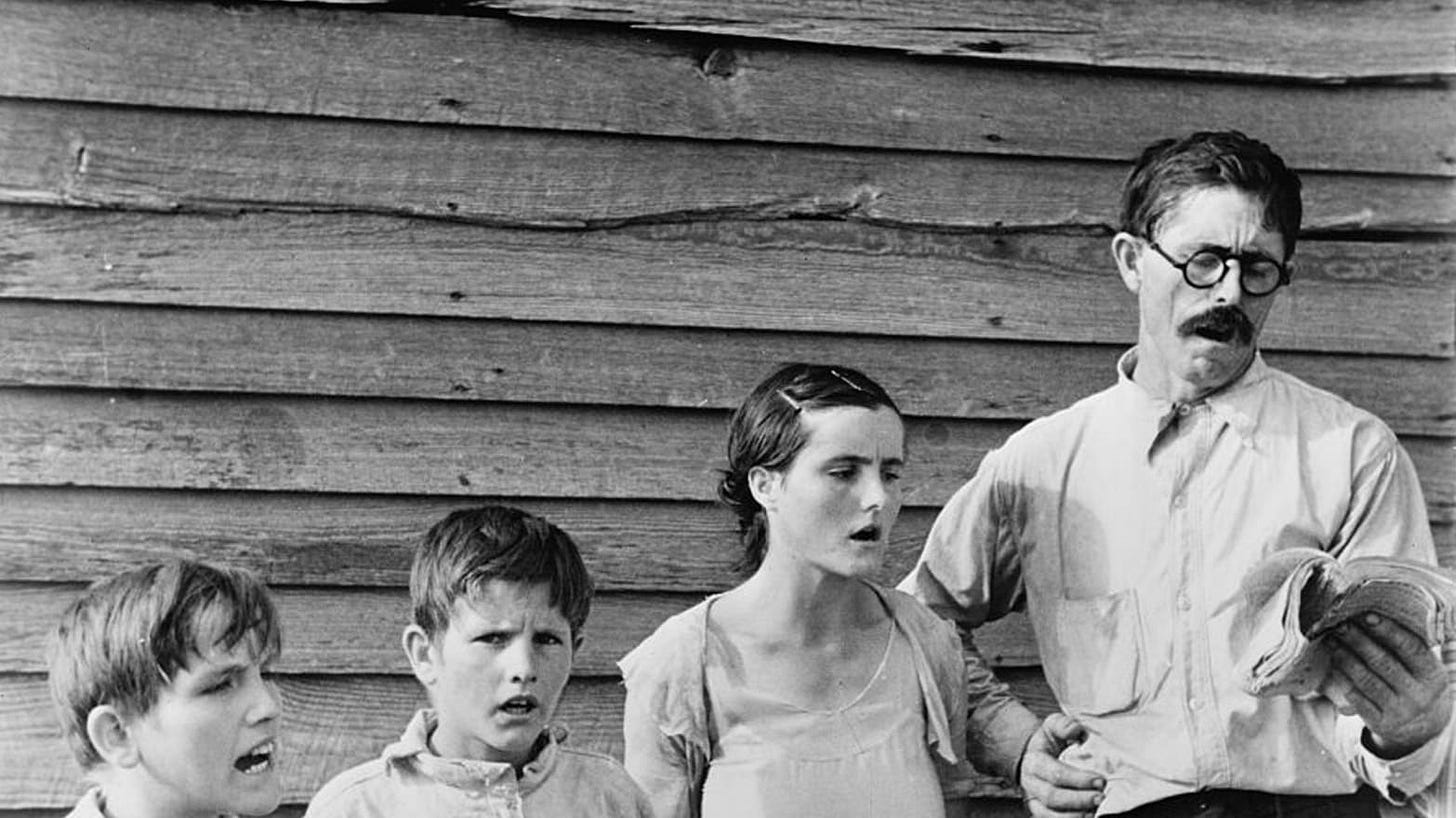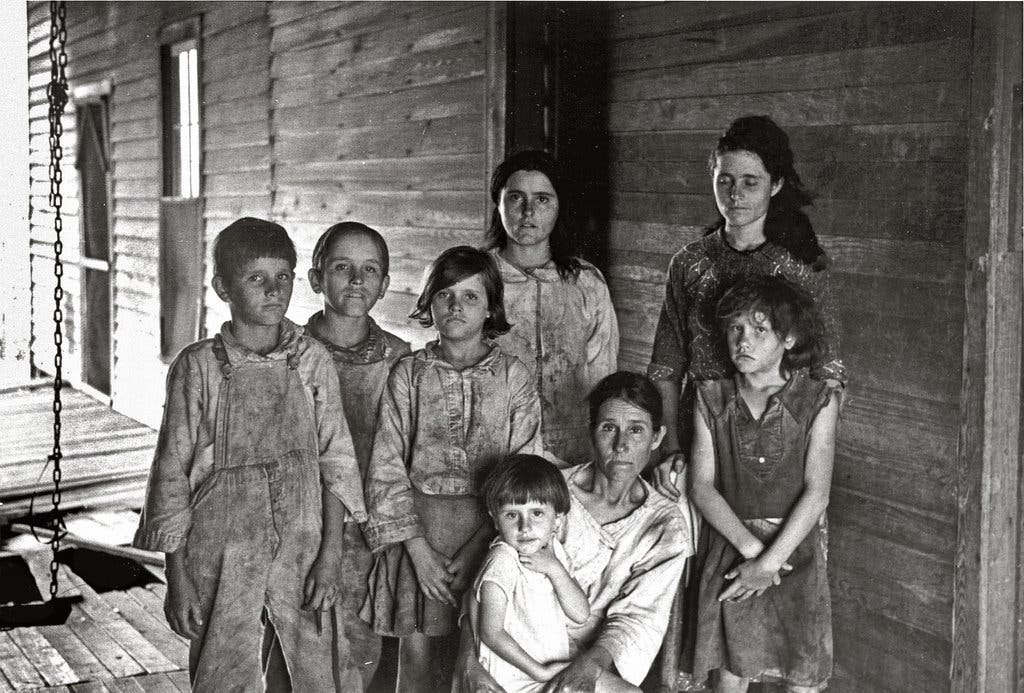Certain works of art live hallowed in the distance before you ever encounter them. James Agee’s Let Us Now Praise Famous Men was like that for me. I knew it mattered, meaning writers I like—Leslie Jamison, John Jeremiah Sullivan—liked it. But this week I read it. Well, I listened to it, as Agee himself recommends in the preface. It was more often than not exhausting, frustrating. And also it was great, invigoratingly so. Most meaningfully, it made me want to write.
The premise is straightforward: Agee and photographer Walker Evans spend two months in Alabama living among three families of white sharecroppers. The year was 1936, the Great Depression a violent presence. Agee’s subject was daily life: menial tasks, physical spaces natural and man-made, clothes and animals and food. He documented all of these in painstaking detail, but it’s his philosophical tangents—torrents of revelations he finds himself caught up in—that make the book a sacred text.
These tangents called Agee to their alters. He needed to obey them. They were his critique of journalism proper, the false sense of authority produced by observational sterility, the description of surfaces. We shouldn’t merit lifeless writing for its lifelessness, he claims.
Who, what, where, when and why (or how) is the primal cliche and complacency of journalism: but I do not wish to appear to speak favorably of journalism. I have never yet seen a piece of journalism which conveyed more than the slightest fraction of what any even moderately reflective and sensitive person would mean and intend by those inachievable words, and that fraction itself I have never seen clean of one or another degree of patent, to say nothing of essential, falsehood.
So Agee pursued his own brand of honesty, which to him meant subjectivity. He’s a compulsive confessor, and intrusively horny. A long drive has him in heat, and only a whore will sate him. He’s constantly apologizing for his writerly shortcomings and accusing his audience of complacency. Most off-putting, there’s Agee’s pathos-lathered portrait of Emma, a teen on the eve of moving cross-state with her abusive husband. He listens as she sobs; he regrets his inability to help. Agee clearly aches for the girl and soon you’re hurting too, but then his sympathy curves perverted. He admits he wants to fuck her, and you’re left questioning his motives, his morality, and his ability to write a world outside his own head.
Still, I appreciate his willingness to subordinate self-valorization to honesty. The same bed bugs eat Agee’s blood as his subjects’. Sex is everywhere. Add that he’s a freudian, and the references to primal scenes and oedipal urges make more sense—so too the masturbatory prose, the text touching itself as Agee insists on self-consciousness.
I’m hung up on the ending of Famous Men. Agee sits on the porch of a tenant shack with one of its residents. It’s night, the dark purring with birds and frogs and bugs. A new sound joins the chorus, at first unrecognizable. They determine it’s a fox. Then another fox joins in, and Agee listens ecstatically as the two animals call back and forth.
This calling continued, never repeating a pattern, and always with what seemed infallible art, for perhaps twenty minutes. It was thoroughly as if principals had been set up, enchanted, and left like dim sacks at one side of a stage as enormous as the steadfast tilted deck of the earth, and as if onto this stage, accompanied by the drizzling confabulation of nocturnal-pastoral music, two masked characters, unforetold and perfectly irrelevant to the action, had with catlike aplomb and noiselessness stept and had sung, with sinister casualness, what at length turned out to have been the most significant, but most unfathomable, number in the show; and had then in perfect irony and silence withdrawn.
This dialogue splits Agee open. It turns him into a giant ear, a receptive vessel. The whole world’s dramatic meaning hides in the wordless exchange.
There was the frightening joy of hearing the world talk to itself, and the grief of incommunicability.
It’s here I want to linger. At the intersection of the world talking to itself and incommunicability. Two foxes speaking in perfect dialogue. An experience understood beyond language. Musical meaning-making in non-semiotic terms. What does music say that it can’t say?
Kath Bloom and Loren Connors
Agee and the end of Famous Men has me rethinking Kath Bloom and Loren Connors’s work together. Like Agee, the duo can be annoyingly difficult. They have three streamable LPs and many more impossible-to-find collaborations. I think I found Bloom and Connors through Byron Coley, documenter of Sonic Youth, champion of John Fahey and Michael Hurley. Bloom had 15-minutes of fame when Richard Linklater used “Come Here” in Before Sunrise, including a Connors-less version for, I’m sure, matters of palatability. More on that in a second, but first, enjoy these two pretty people falling in love.
Loren Mazzacane Connors gets roped in with John Fahey, both being white guys who experimented with the blues past the point of recognition. The similarity ends there. Connors’s form of choice is a pesteringly whiny slide guitar, a language that leaves every phrase open ended. He’s an improvisor. His greatest influence is Mark Rothko.
Bloom sings over Connors’s sliding, her voice equalling his uncertainty. She vibrates off key in a perpetually anxious warble, but earnestly so. It’s this quality that reminds me of Madeline, a child-voiced singer/songwriter who released a few 2000s LPs on Orange Twin, the Athens, GA label that put out Sibylle Baier’s Colour Green. When Bloom goes high, there’s a hint of Joan Baez, just without the virginal beauty of that soprano.
Before, I would listen to Moonlight and wish Connors would just play normally, that he would slide to somewhere and play there awhile instead of inflecting every riff as a question. Same with Bloom, why can’t she just hit a note and hold it? But I started to think of the duo as Agee’s two foxes. And slowly, I started to get somewhere.
Let me be specific. “Can You Find Me?” from 1984’s Moonlight. Bloom singing, Connors sliding, and a third person, Robert Crotty, playing a comfortably familiar acoustic guitar.
Connors’s slide guitar begs. It makes everything uncertain. Robert Crotty’s guitar the exact opposite. A chugging, the life-beat of trains and rain patter. It’s an optimistic pulse, three triplets thrice over, resolved on the fourth go as he switches chords. When I’m walking down the street. When I’m walking down the street, Bloom sing-speaks. The vibrations in her voice seem seismic: the sound could split open and she would fall into it. You could call it ‘fragile beauty’.
Try hearing Bloom’s voice and Connors’ guitar as a conversation. Connors says instrumentally what Bloom can’t say. It’s easy to stop taking Bloom seriously if you focus on her too closely. Love loves cliche. She’s talking about feeling god in her beloved’s eyes, his voice. It’s the canned stuff of sad ballads and the radio. But Connors makes the song more than that, his supremely weird accompaniment always bending out of ear shot. There’s self-doubt in it, the inability to let a note be. Bloom’s sung worry—doubled in Connors’s instrumental—takes on new intensity triangulated with Crotty’s insistently basic guitar. The indeterminacy of the duo needs something to stand on, a constant. That’s Crotty, providing forward progress. Connors functions like an internal monologue: the inside of Bloom’s brain that wouldn’t make sense in words. You ever try to write stream of consciousness? It winds up garbage, mostly, but it makes sense to you. By talking without words, Connors can, at his best, communicate incommunicability. He can do the stream of consciousness thing while evading its primary pitfall. I won’t say it’s the nicest music to listen to, the most comforting. It is different though, and not for contrarian’s sake. Bloom and Connors together access what others can’t imagine: the joy of the world talking to itself, and the grief of incommunicability.






